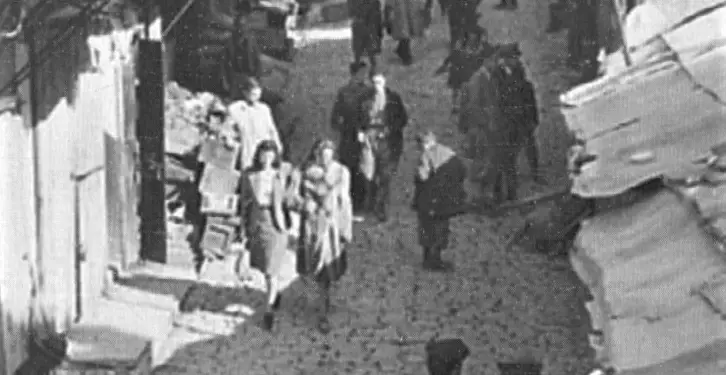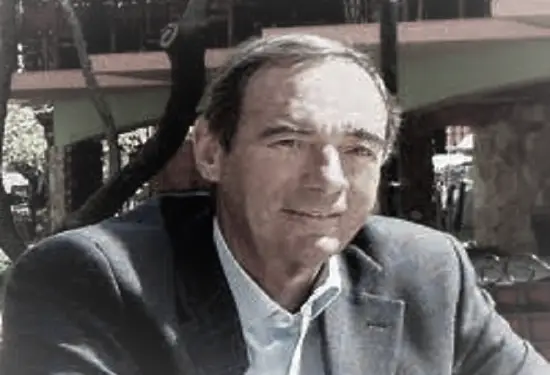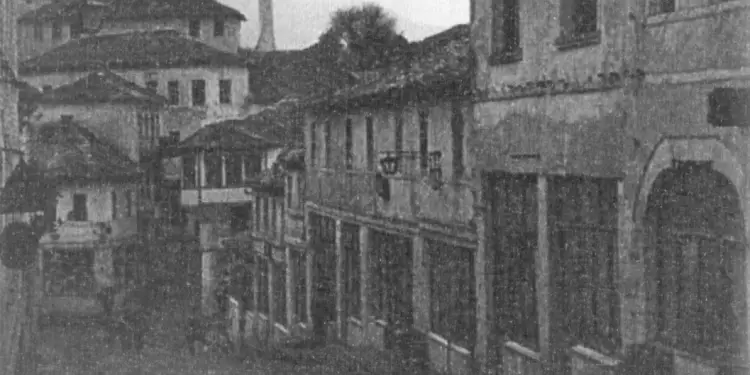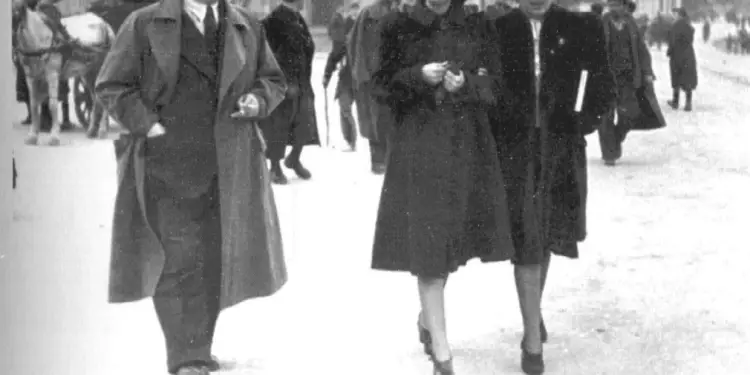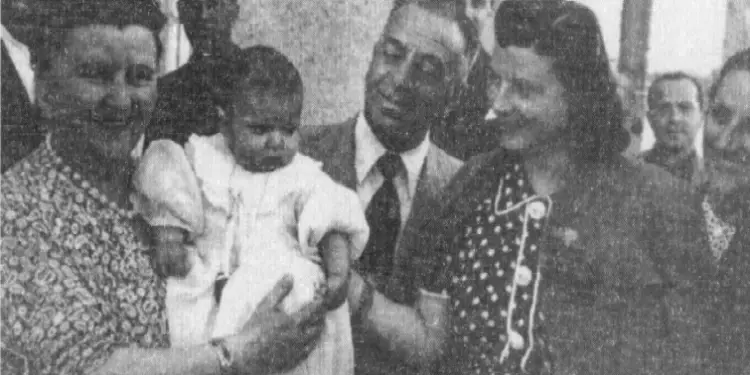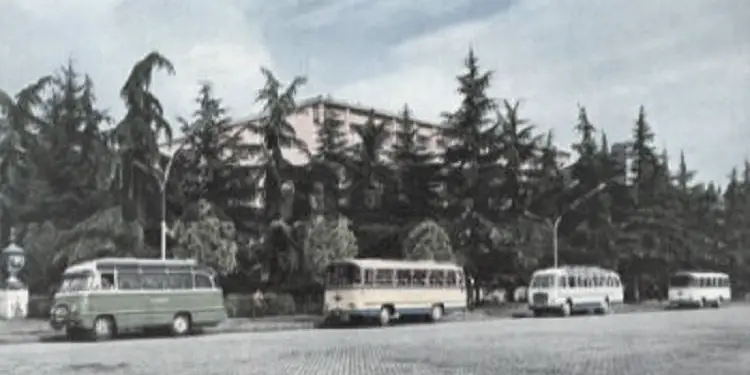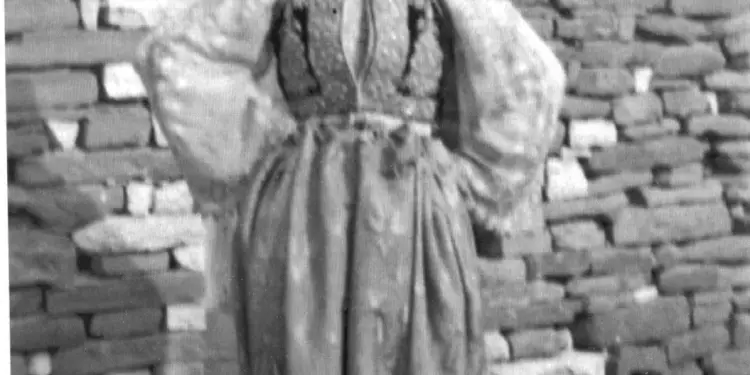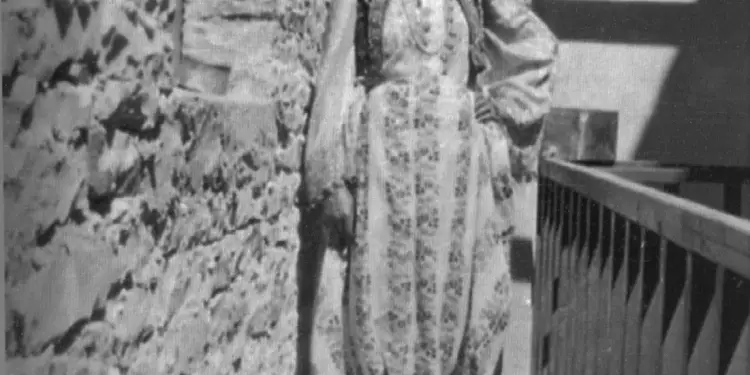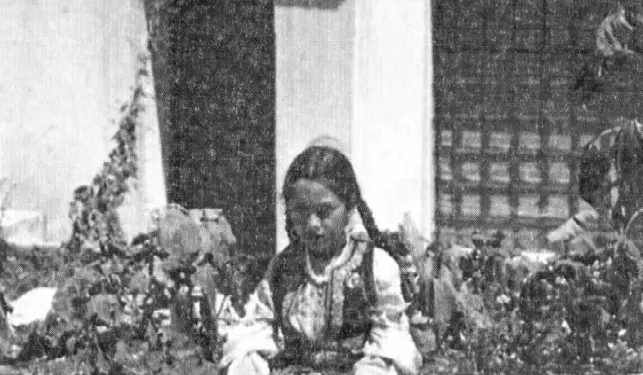By Aldo Renato Terrusi
The third part
Accueil
Memorie.al / Fiumicino Airport. Alitalia’s ‘MD 80’ plane is ready for flight. It’s Saturday, November 6, 1993. 11.25am. The commander received approval. The flight attendants remind us once again to fasten the seat belt. The two engines are brought to maximum power, while the noise becomes muffled and deafening. Buttons and controls are tested for the last time according to flight procedures, the brakes are released, the faster and faster movement begins, the acceleration slams the passengers into the back, the plane takes off. I feel an invisible force lift me up, leaving me suspended in the void. I look around to see if the other passengers have the same feeling as me. Some read, some look out of the window, some are indifferent, some barely sit still and some, frozen in their seats, let their fears show. With a wide change of direction, the plane rises in altitude and heads towards the radio beacon of Bari, then straight to Tirana, our destination.
I look around and I can imagine the many events that have taken place here: ceremonies and dance balls, beam ladies in evening dresses who were visited by gentlemen from countries with no interest in the fate of Albania. Personalities who have sat together at these tables: the Italian foreign minister during fascism, Galeaco Cano, during his official visits; Ahmet Zogu. King of the Albanians, who held the reception here on the occasion of his marriage with Countess Xheraldina Aponi; the meetings of Mehmet Shehu and Enver Hoxha with their executioners; the secret agreements between arrogant German hierarchs and arrogant Albanian political commissars; collaborations between Moscow’s scheming emissaries and servile Yugoslav spies; agreements between rich Italian merchants and cunning Albanian hierarchs.
In this place, during the years 1930-1950, a good part of the history of modern Albania was established. Who knows how many absurd decisions have been made at the expense of the ignorant people, how many conspiracies, how many respected and violated pacts and how many strategies have been elaborated under this roof! At one time, in this salon, celebrations and honors were also held for the footballers of the legendary Albanian football team, which won the Balkaniad in 1946. A waiter dressed in a dirty tuxedo brings us antipasti with cheese and olives and offers us brandy, high alcohol drinks.
“Get healthy; this is a typical Albanian drink”!
The truth is, not only Albanian: it is a distillation that, in its various typologies, is characteristic of the entire Balkan peninsula, from the Greek ouzo to the Slavic shlivovica.
“Do you all really speak Italian that well?”
“Yes of course. Mind you, some from our fathers, and some from the television… then there are many schools where Italian is taught, that is, Italy is a second homeland for us”.
They also give us Kallmet red wine. Not bad at all. The first course is spaghetti with Italian ragu, slightly burnt, with a somewhat sour taste of box meat of questionable quality. The second course is a quarter roasted chickens with salad garnish, acceptable as a relish. Seasonal apples and finally, an impressive pudding followed by a much-needed espresso.
It’s almost 4:00 p.m. when, before getting up, a hotel employee approaches us: “Someone has come for Mr. Pozeli is in the salon”.
We get up and go to the lobby. A young man, not very tall, thin, gray-haired, with a friendly face, is waiting for us at the foot.
“Good morning, I’m Fatmir Demneri, my father was a footballer and a very good friend of yours when you played together with the Albanian National Team”.
“I remember your father very well. He was my close friend. Listen, Xavit, how did you find out that we were coming here, who told you”?
“The director of “Dajti” is a fan of football and now all the old athletes from Tirana know that Giacomo has come here”.
“How is your father, if I may speak to you”?
“Yes, of course. He also found out that you were coming, and I believe that he will come to meet you very soon. I am a sports journalist and if you allow me, I wanted to interview you in front of the cameras”.
“Since you loved it… but I have never given interviews for television.”
“Don’t worry, it will be given later.”
“How so”?
“First we record it and then we broadcast it. If there was a mistake, we delete it.”
Anyway the conversation takes the flow of the interview, a preparation for what would be held in the studio a day later. Say hello and see you the next afternoon.
“What do you say uncle, wouldn’t it be better to go back where we came from”?
At the reception, they give us the keys to two rooms close to each other.
“I hope you like them, they are among the best”!
“Thank you”.
We climb the wide winding staircase, which leads from the lobby to the first floor, traversing endless corridors half-lit with elegant red directional lights, and finally we arrive at the appointed rooms. Mine is relatively small, unassuming, with dark old imperial style furniture, white linen curtains on the windows, the headboard is veneered, the bedspreads seem to be of the same era, and the mattress is shapeless and sunken. .
The square bedside table, with light colored wood, does not combine at all with the rest of the furniture. The bedroom light has a circular white marble base, brass extension, fringed Havana silk front lamp, ceiling lamp in a white glass ball, 1950s style. In front of the bed is an ancient chest of dark wood, fitted with a white marble top and three drawers. On the walls are hung (without any idea), some discolored panoramas with views of the monuments of ancient Rome, combining quite well with the almost equally ancient tapestry.
The apartment tells of all its years, with white marble cladding, mixed marble tile floors, standard Italian ceramic sinks ideal since the 30s, dripping Rococo faucets, bathtubs with lion’s paw supports and the mirror clouded by time.
Yes, these are among the best…guessing the others.
I open my suitcase, freshen up a bit; it’s almost time to go out for dinner.
There is no television in the room, so I have no choice but to go down to the lobby, which also serves as a meeting room.
Several men are chatting and smoking while sitting on red velvet armchairs. A woman’s leg is nowhere to be seen. They left the TV on an Italian channel. After a while my uncle comes down and sits on the couch next to mine.
“Uncle, let’s rest a little here, I would like you to continue the story about the history of our family. Where did we get to?
“Not far actually… our people were still in Italy…! So, you should know that from Castile and Sicily, other members of the Pozeli family had also emigrated, who, in Turkey, had achieved a relative well-being, and such a fact had spread throughout the country.
The leader of the emigrants to Turkey was Vitaliano Pozeli, who was called to Constantinople in 1870 to oversee the design and restructuring of St. Stephen’s Church. He worked for Sultan Hamit I and Abdyl II; the latter gave him a very valuable reward. Vitaliano returned many times to Castile, but his heart remained in the East, and especially in Greece, where he loved ancient art and literature, so he finally moved to Thessaloniki, where he spent the last days of his life.
Your great-grandfather Salvatore, Vitaliano’s brother, had taken another route and headed to Egypt, which at the time was in great need of skilled labor for the construction of the Suez Canal. At the same time, Giacomo Covi, a Trentino excited by the projects for the Suez Canal of his fellow citizen, engineer Negreli, had gone to Egypt with his own construction company, to collaborate in what seemed to be the greatest work of the century.
With the start of the works in Suez, in all regions of Italy, but especially in the South, the laborious search for low-cost workers began. Employers played well with the poor and it was very easy to engage team leaders to recruit labor. They were promised a tenfold salary and a steady job, in addition to the mirage of a wonderful country. At the same time, an unusual female migration to Alexandria and Suez took place. Single women looking for a job, economic security and probably, even a “good plot”. Giacomo and Salvatore got to know each other in the small Italian community that had gathered around the canal excavation sites. They became friends and adventure buddies.
After the inauguration of the canal in 1869, the companies that had participated in the construction began to license various craftsmen, and Salvatore found himself in front of opportunities to think about his future. In Suez, in addition to learning Arabic, he had also gained some experience. When he heard the news from Castiglione that his parents had moved to Turkey and made a fortune there, he didn’t think twice, but returned to Italy and immediately after that, he took the first ship to Istanbul. It was a beautiful ship of the Trieste Company “Lloyd Adriatico”.
Almost at the same time, Giacomo, having completed the works, had partially liquidated his company, seeing that Turkey needed qualified personnel, returned to Italy, founded another company and set off on a new adventure in foreign land”.
“What year is it about?”
“1870. Salvatore was young and short-tempered; he was only 27 years old, with little money in his pocket, with experience in construction, with relative knowledge of the language, so he felt ready to face a new activity. He was one of the eight sons of Giuseppe Pozel. Despite the other two brothers, in Sicily he found nothing to satisfy him and convince him to stay. The only future that was offered to him was to work in agriculture for an entrepreneur who managed the manors of the provincial barons. For the rest of his life he would do only that job, with no other way out and with a salary just enough to hold his breath. This job was not for him.
With the help of his brother Vitaliano, who was already a well-known architect in Turkey, he found work as a specialized worker in an Italian construction firm in Istanbul. After five years, during which he worked hard with the owner on top, he managed to save enough to set up what he had in mind: a small business of his own. He bought two trucks and all the necessary equipment and together with some Italian friends and a group of Turkish workers, his construction company came to life.
Our family, which at that time had stabilized in Izmir, found itself in the middle of the Greco-Turkish war. There was no more time to lose, Vitaliano’s life was at stake together with his wife Ema, pregnant for the third time and with both daughters, Aurelia and Karmen, he left the construction site in Konya and with a truck loaded with loot, suitcases and other belongings followed the fugitives towards the town of Adalia on the Aegean coast, where a contingent of Italian carabinieri was still in operation.
In the port of Adalia, the Regia Nave Dmho, the beautiful warship of the Italian fleet, was still standing, protecting the Italian troops and civilians. This ship, in addition to the soldiers of the Italian contingent, also took with it the refugee civilians and with them, Vitaliano and his family”.
We eat a simple dinner: a soup, white wine, two bananas.
Even tonight, the only table set was ours. We don’t feel like going out because it’s night and, not knowing the environment, it doesn’t seem like anything. In addition, fatigue shows.
So we get comfortable in the armchairs of the salon.
“Where is Toli from… he said he would come to greet us…”!
As soon as he finished speaking, Toli did it.
“I’m sorry, but I had work at the Embassy. I’m only sitting for two minutes.”
“Sure, sit down.”
“I spoke on the phone with Petriti, one of the gentlemen who knew Xzepe Terruzi in prison; he said that he is waiting for us on Thursday morning at his house, in Vlora.
“Okay, how are we going to go”?
We can get a taxi, I’ll even talk to the driver tomorrow to make sure we have him available for Thursday and to discuss the payment. It is not worth going by other means, also for the reason that it is not known when they leave and even less when they return; then they’re not suitable… they’re moving crap. I’m going home, because I thought it was late. See you tomorrow from 9.30; hopefully time will hold. Good night”.
“Goodbye”.
“Aldo, it’s 10:30 p.m., I believe you’re tired too; let’s go to sleep”?
“You go, I’m coming later… I’m very excited, I can’t sleep, and I’ll see you tomorrow at 9:00 a.m. to have breakfast.”
In the morning, I am woken up by a noise that sounds like grief. I open my eyes, look around, and realize where I am… everything is fine. I open the shutter and understand the noise more fluidly: it’s raining and the pierced lamb unloads right on the threshold in front of the window.
It is almost 7 in the morning, but enough light penetrates the leaden sky to make out the surrounding area; therefore, the street lights are already turned off, so only the high lights of the few moving cars can be seen, which are reflected on the asphalt. The city is still asleep.
A hot shower gives me strength and enthusiasm, I dress calmly.
I think back to the conversations of the night before: it never occurred to me that the historical events of that time were so complicated. My musings are interrupted when I hear a knock on the bedroom door. I open it.
“Good morning, uncle. Are you ready?”
“Yes, as tools, right”?
“Yes, everything is fine. Go inside until I’m cold and then we go down. How was your room”?
“More or less like yours, not anything.”
Breakfast is simple, continental, but two things make my eyes light up in anticipation of what I’m about to try: sheep’s milk, thick as curds, and thick, grainy honey. Before milk, tea, first of all, I take a few spoons of sour cream in a bowl, then honey and mix them together. A real delicacy!
“At least here there are still things with the same truth”!
“Aldo, do you remember the ‘meals’ that your grandmother used to make? We will try to find them in a special restaurant”.
“Ah, if we could really find them”!
OLD FRIEND
As soon as the rain stopped and the last drops are drawing some small circles in the gutters, the sky is filled with clouds and it has cooled. We are on the threshold of Dajti’s entrance, the time is almost 9.00 and in the meantime we see Toli coming towards us.
“Good morning Pozeli”.
“Good morning”.
“Good morning Terruzi”.
“Good morning. Toli, let’s go inside and have a coffee.”
“OK thank you.
“Do you want an Italian espresso”?
“Yes thank you. Eh, the weather is whimsical and maybe not very suitable for a walk in the city, but we decide to meet the President of the National Association of Former Political Persecutors. He promised me that he would take us to Burrel t prison. Looking at his post, it seems that he is the only one who can do this job”.
While we are drinking the espresso – almost as good as an Italian – a man of small stature, with a timid demeanor and polite look, with hair falling to his temples and dressed dignified in a jacket and collar, approaches us. Uncle Giacomo suddenly gets up with all his energy, while the stranger, almost running, jumps on him.
A long endless embrace and tears of joy, a touching scene even for the mere spectator. Finally, the two men separate, all disbelief in each other’s eyes and sadly hug each other once more.
“Do you remember”?
“I remember”!
And then tears and hugs again. Finally, after a few minutes, the two friends let us share their emotions.
“Aldo, this is Xhavit Demneri, my dearest friend and player of the Albanian national football team in 1946 and 1948. Together we won many sports battles and shared both the joy and the sorrow of those times.
Spartacus, the director who had informed Demner about the arrival of his friend, did not speak, he was a little shy to share the pleasure and sincere happiness of the two protagonists. Even Toli was stunned before this sudden scene of deep friendship”. Memorie.al
(Excerpts from the book, ‘Brenga ime albanian’)




